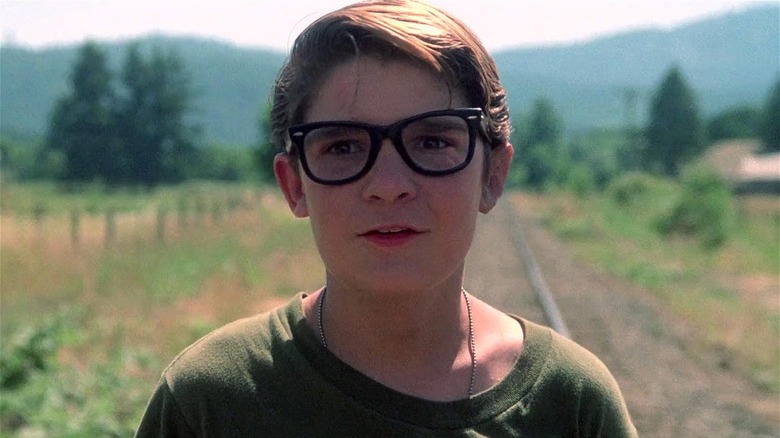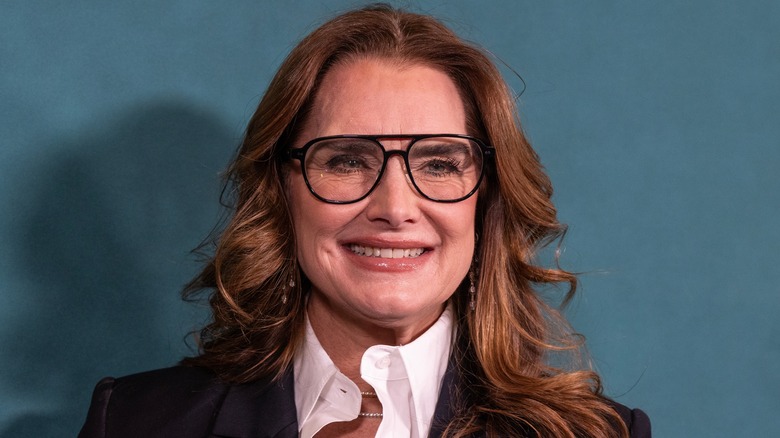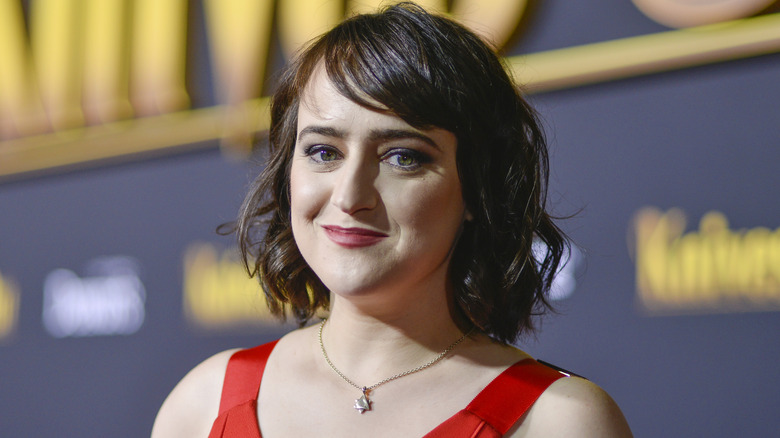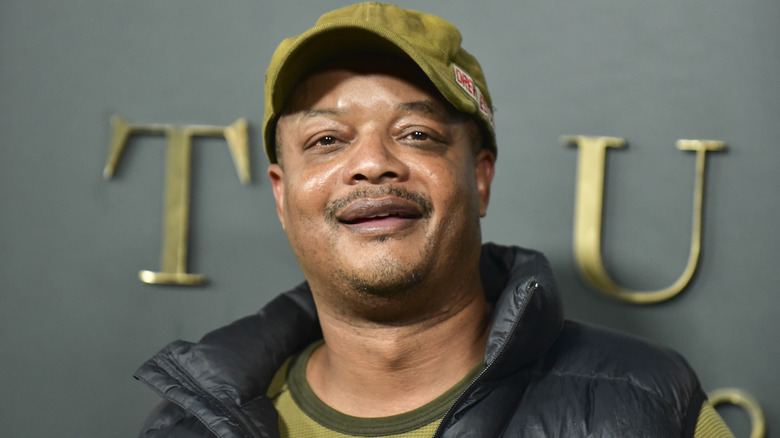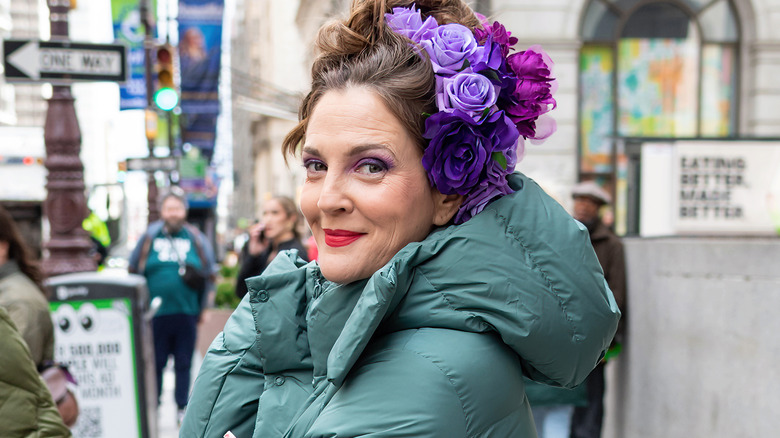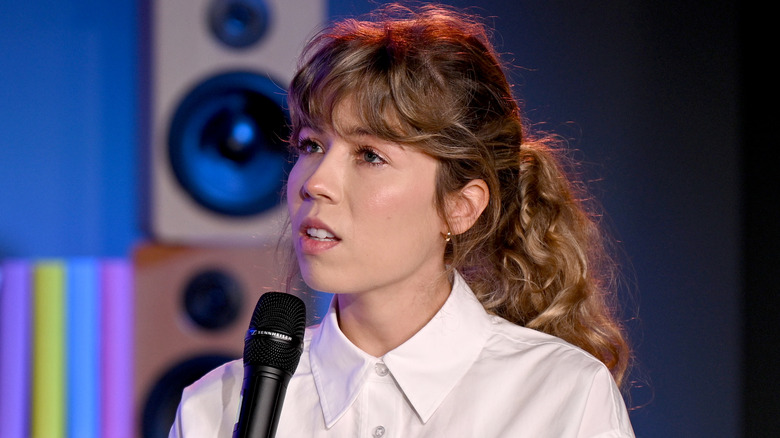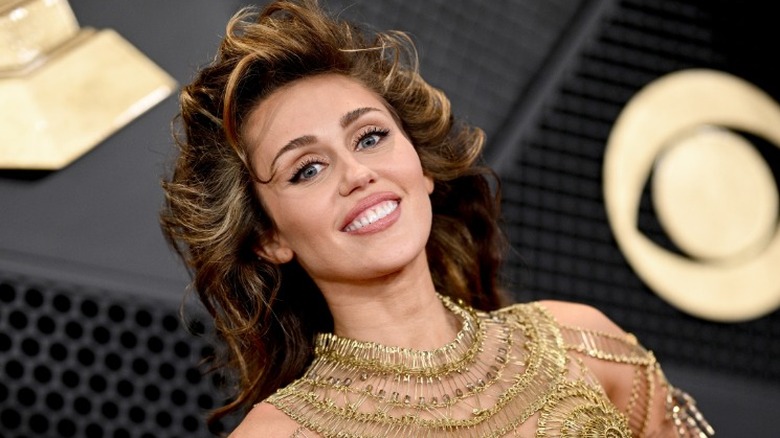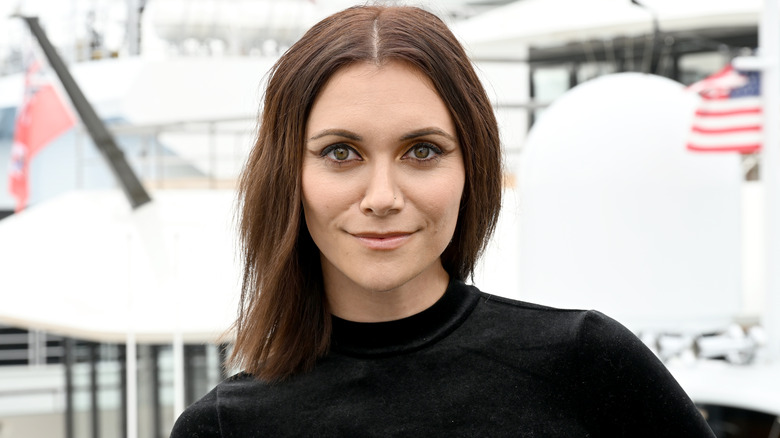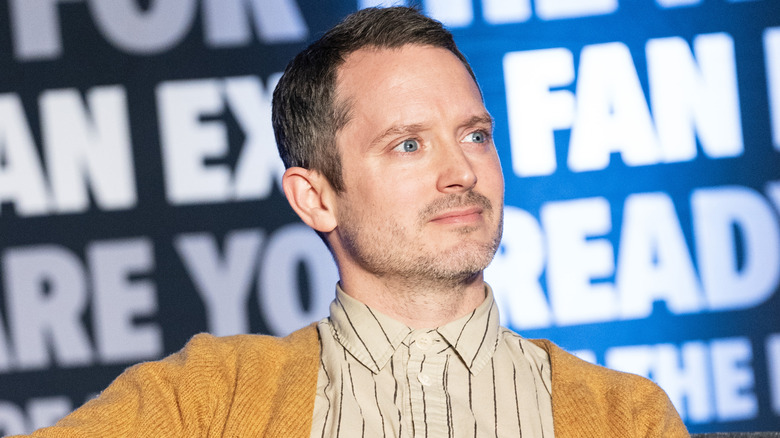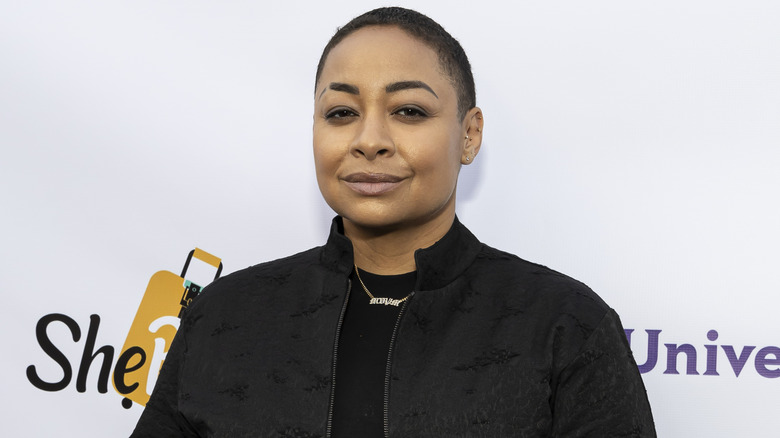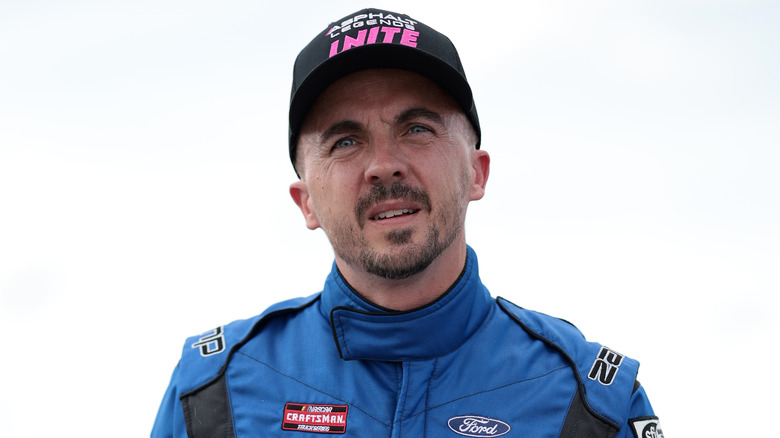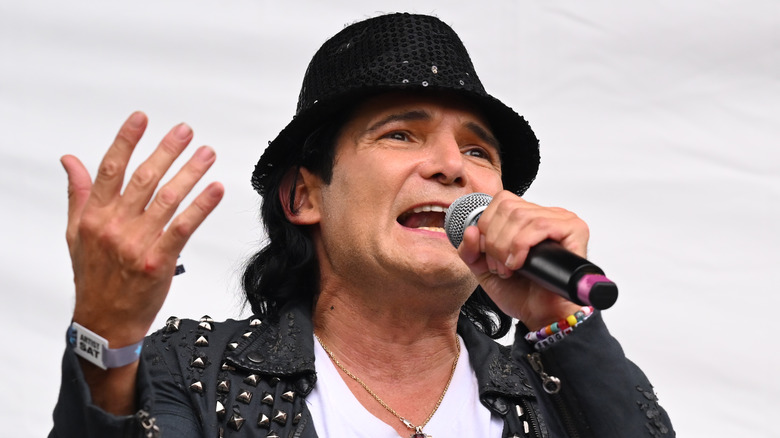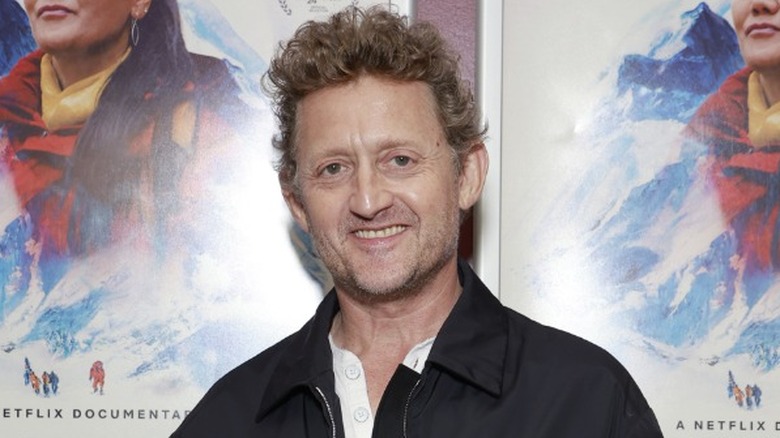Child Stars That Put Hollywood On Blast
Being a child star can be tough. According to neuropsychologist Dr. Sanam Hafeez, director of Comprehend the Mind, a child's wellbeing can be impaired by the rigors of Hollywood life. "The constant demand to perform at peak levels can lead to chronic stress, anxiety disorders, and depression, impacting mental health significantly," Dr. Hafeez exclusively told Looper. "The focus on external validation and fame can distort personal values and priorities, influencing future decisions and life satisfaction." Relationships with family and friends can also be negatively impacted, since parents often take on managerial roles that further blur the line between home life and career, and the time-consuming demands of acting make socialization harder.
In light of all that, it's no surprise that many child stars have had extremely difficult experiences navigating the pitfalls of fame in early life. Child safety laws have been expanding across Hollywood, as entertainment and employment attorney Camron Dowlatshahi of Mills, Sadat, Dowlat LLP exclusively told Looper. "Child safety continues to be a focus for legislators around the country," Dowlatshahi said. "Specifically, in the film industry, SAG-AFTRA has made it a point of emphasis by ensuring limits on working hours, available hotlines, and background checks on those working with minors." While this is welcome news, sadly, it comes too late for many. The following child stars have all spoken out against Hollywood's treatment of kids.
This article discusses sensitive topics, including the sexual abuse of children. If you or anyone you know has been a victim of sexual assault, help is available. Visit the Rape, Abuse & Incest National Network website or contact RAINN's National Helpline at 1-800-656-HOPE (4673).
Brooke Shields
Many viewers know Brooke Shields for her various TV roles from the '90s onward, including a small but career-changing cameo on "Friends." But, early on in her career, she was notable as a child actor who took on a series of highly sexualized roles — most notably the characters she played in "Pretty Baby," "The Blue Lagoon," and "Endless Love." Speaking about her career at a 2024 South by Southwest panel in honor of International Women's Day titled "Breaking Barriers, Shaping Narratives: How Women Lead On and Off the Screen," Shields opened up about her experiences as a child star who was cast in several inappropriate roles.
"There was this sexualization of young women and I was at the center of it," Shields said (via Daily Mail), crediting her mother and the people around her with keeping her safe from predators. "I was surrounded by a strong mom, had a community around me, I did not become the type of statistic that Hollywood created." She argued that "Hollywood is predicated on eating its young," and affirmed her passion for making the industry a more inclusive place for women over 40. "We're not just wrinkle cream," she told attendees. "We need to change the narrative — and say that there is beauty in this age."
Mara Wilson
After taking the world by storm in the '90s with her child roles in "Matilda," "A Simple Wish," "Miracle on 34th Street," and "Mrs. Doubtfire," Mara Wilson stepped away from film acting, focusing intermittently on stage work while joining the ranks of child stars who wound up with normal jobs as grown-ups. In the 2010s, she reinvented herself as a writer and social commentator, and her 2013 article for Cracked, titled "7 Reasons Child Stars Go Crazy (An Insider's Perspective)," became notable for the honesty with which it exposed the many difficulties of dealing with child stardom.
According to Wilson, although she started acting of her own volition at age 5, not all kids in the profession are so lucky, with many being pressured into it by their parents and becoming primary breadwinners for their households. Wilson added that celebrity kids are especially vulnerable to predators and to sexual objectification beyond their parents' control. Wilson advised up-and-coming young stars to think seriously about whether they really want to be actors, and to trust their own ability to reinvent themselves career-wise. "Make sure it's really your choice, get out of it when it stops being fun, and get an education," she wrote.
Todd Bridges
Todd Bridges, who became known in the '70s and '80s for the role of Willis Jackson on "Diff'rent Strokes," revealed on "The Oprah Winfrey Show" in 2010 that he was a victim of sexual abuse at age 11, perpetrated by his own publicist. A few years later, he went on CNN to advocate for a California bill that would make background checks mandatory for some film and TV professions, particularly jobs that gave people close access to child stars. Speaking in support of the bill, Bridges noted that the abuse he suffered was facilitated by the entertainment industry.
"We have to make people realize that children need to be safe on these sets, and they're not safe, because the parents want their kids to be in show business so bad that they'll wanna do anything, and they'll send them off with strange people, and that's something that you just shouldn't do," Bridges told CNN. "You have to have these background checks before you get around these minors in showbiz, because, it's like, show business is an open field for child molesters." The bill in question, AB1660, received support from the Screen Actors Guild, and was ultimately signed into law by then-governor Jerry Brown in late 2012.
Drew Barrymore
Drew Barrymore is one of the most popular and widely beloved American actors of her generation. There was a point in time, though, in which she was known as Hollywood's foremost teenage rebel. A highly in-demand actor since her early childhood, she grew up in the spotlight and had a notoriously turbulent adolescence as a result. In her 2015 memoir "Wildflower" (via The Guardian), she wrote: "I was out of control due to working since I was 11 months old and what that had done to my childhood, which made me grow up too fast."
Due to her struggles, Barrymore became wary of letting her own kids face the kind of overexposure she did. In a 2024 interview with People, she said: "[My kids] would love to be in film or on social media or sing, and I always just say, 'School plays, theater camp, everything, [yes]. But [no to] being out there in the public eye until [...] I think you're ready.'" Even so, she stated that she didn't feel the movie business in itself was inherently toxic: "It has given me every opportunity under the sun and I couldn't appreciate my life more."
Jennette McCurdy
Nickelodeon's "iCarly" was proof enough of Jennette McCurdy's immense talent and ample comedic skill. But, in 2022, following years of retirement from acting, McCurdy showed she also had the goods as a writer by publishing the critically acclaimed memoir "I'm Glad My Mom Died," in which she discussed her struggles with child stardom through the lens of her fraught relationship with her late mother.
McCurdy was never the same after "iCarly," and she explains why in her book. She reveals that she took up acting to fulfill her mother's dreams, that being a teen celebrity pushed her into anxiety and eating disorders, and that the work environment at Nickelodeon was often grueling, vexing, and detrimental to her development. She says that she endured it all because her mother claimed it was the price of success.
Following her exit, Nickelodeon reportedly offered her $300,000 in exchange for never discussing her experiences at the network, which she turned down. "My whole childhood and adolescence were very exploited," McCurdy revealed to The New York Times in 2022, adding that she avoids ever watching any of the shows she was on and that her decision to quit acting was driven by a desire to take control of her life. "I want my life to be in my hands," McCurdy said. "Not an eating disorder's or a casting director's or an agent's or my mom's. Mine."
Miley Cyrus
As teen star-to-adult artist transitions go, Miley Cyrus is one of the big success stories of our era. She's so consolidated now as a beloved, versatile, dazzlingly talented recording artist that it's sometimes hard to remember that she used to be the star of Disney's "Hannah Montana." She loved being on the show at the time, Cyrus told CBS Sunday Morning, but, looking back, she can see how all that pressure was problematic. "I think now that I'm older now, I realize that's a lot to put on a kid," she said.
Cyrus has also said that the media scrutiny she received for the controversies of her rebellious era made her feel guilty and ashamed for years. "Now that I'm an adult, I realize how harshly I was judged," she told British Vogue. She has also opened up about developing body image issues while playing Hannah Montana, telling Marie Claire, "I was made to look like someone that I wasn't, which probably caused some body dysmorphia because I had been made pretty every day for so long, and then when I wasn't on that show, it was like, 'Who the f*** am I?'"
Does this mean that she's done with Hollywood for good? Not necessarily. Cyrus would return to acting on one condition, she revealed in 2024 interview with W Magazine. She said: "The role would really need to be right, since it's kind of hard for people to see past me and buy into a character."
Alyson Stoner
In an op-ed for People in 2021, Alyson Stoner (who became notable as a teen actor in projects like "Cheaper by the Dozen," "Step Up," and "The Suite Life of Zack & Cody") discussed their experiences with what they dubbed the "toddler-to-trainwreck pipeline." According to Stoner, the child star system is "constructed and bolted in place by censoring the harm happening behind the scenes, manicuring aspirational lifestyles and outcomes, and then watching young lives tragically implode."
Accusing Hollywood of perpetuating harm against young stars and then painting the ensuing mental struggles as isolated cases, Stoner wrote in first person about familiar industry experiences. Those experiences pointed to an absence of safety measures ensuring the wellbeing of child stars, especially young and impressionable ones who might create harmful psychological associations between the "methodically rehearsed helplessness" of certain roles and the praise or rejection resulting from it.
Stoner also called out the lack of strong regulation regarding working hours for child actors, in addition to "the sexual harassment, stolen IP and money, paparazzi, psychological impact of the new influencer landscape, [and the] toxic power plays." Throughout the article, they pushed for systemic change in Hollywood, including the hiring of on-set mental health professionals and courses for guardians and representatives.
Elijah Wood
Before headlining Peter Jackson's "The Lord of the Rings" trilogy as Frodo Baggins and becoming a worldwide movie star, Elijah Wood was prolific as a child actor in '90s films like "North," "Avalon," "The Good Son," and "Flipper." In 2016, the actor discussed the subject of predatory behavior in Hollywood during an interview with The Times. Wood said, "There are a lot of vipers in this industry, people who only have their own interests in mind," adding, "People with parasitic interests will see you as their prey."
Although he made a point of saying that his mother kept him safe as a child and that he "never went to parties where that kind of thing was going on," many interpreted his comments as Wood speaking from personal experience. He then took to X (known as Twitter at the time) to clarify that his indignation stemmed from a documentary he'd watched. He wrote, "Let me be clear: This subject of child abuse is an important one that should be discussed and properly investigated. But as I made absolutely clear to the writer, I have no first hand experience or observation of the topic, so I cannot speak with any authority beyond articles I have read and films I have seen."
Raven-Symoné
With her role as the clairvoyant Raven Baxter on "That's So Raven," Raven-Symoné became one of the biggest Disney Channel stars ever. And, in the years since that show ended, she hasn't kept mum about the downside of being a Disney teen celebrity. Speaking to Yahoo! Entertainment in 2020, Raven-Symoné, who is a lesbian, recalled being called a "liability" by an industry higher-up at the age of 15. She says that she was encouraged to hide her personal life and pressured to "stay in a little box so I don't get in trouble to make sure that everybody else is making their money off of me."
The former child star went on to say that Hollywood "will break you down, build you up, break you down, build you up," and that there's a tendency to "[suck] the life force out of" performers and then leave them to their own devices instead of offering help when they need it most. Raven-Symoné realized years later through therapy how much trauma the industry had burdened her with, though she believes things are different now. "There's so many people out here opening the doorways to so many subcultures, you know, whether it's size, whether it's sexuality, whether it's gender identity," she said. "That's the acceptance that I was waiting for when I was a kid."
Frankie Muniz
Being a kid in the early 2000s meant watching movies starring Frankie Muniz. The actor became recognizable worldwide for his roles in films like "My Dog Skip" and "Big Fat Liar," as well as "Agent Cody Banks" and its sequel. He also wrote his name in the TV history books by playing the titular character on the hit sitcom "Malcolm in the Middle" for seven seasons. Muniz stepped away from his acting career to become an auto racer; he currently competes in the NASCAR Xfinity Series.
Muniz has spoken critically about the movie world. Talking to Pedestrian TV on TikTok in 2024 (via The Hollywood Reporter), Muniz said, "I would never let my kid go into the business." Although he noted that his own experience in the industry was "100 percent positive," he added that "I know so many people, friends that were close to me, that had such insanely negative experiences [and] I just think it's an ugly world in general. I never cared about rejection, but there's a ton of rejection."
Corey Feldman
Corey Feldman is one of the most recognizable child stars of 1980s cinema, with major roles in films like "The Goonies," "Stand by Me" (arguably the best movie based on a Stephen King story), "Gremlins," and "The Lost Boys." In recent years, he has become notable for speaking up about the sexual abuse he allegedly suffered in Hollywood alongside lifelong friend and regular collaborator Corey Haim, who died in 2010. "The biggest problem in Hollywood is pedophilia," Feldman told The Guardian in 2020, the year he released his documentary "My Truth: The Rape of 2 Coreys."
In the film, Feldman alleges that former talent manager Marty Weiss, actor Jon Grissom, and nightclub owner Alphy Hoffman are among Hollywood's abusers. He also said that Haim had confided in him that Charlie Sheen sexually abused him on the set of their film "Lucas." Sheen denied the allegations, calling them "sick, twisted and outlandish" in a statement given to Entertainment Weekly. Feldman has also opened up about the pressure placed on him by his mother, who reportedly made him take diet pills because she thought it would help him land roles. Asked by The Guardian if he'd let his son Zen join the film business, he responded with an emphatic "Hell, no!"
Alex Winter
Actor and filmmaker Alex Winter, who worked as a child star on Broadway and then found fame in the film world with his roles in "The Lost Boys" and "Bill & Ted's Excellent Adventure," revealed in a 2018 interview with BBC 5 that he was molested at age 13 while working in a theater production. Although he noted in the interview that Hollywood had been changing for the better, and that the climate of openness following #MeToo had empowered him to speak up about his experience, he hasn't let the industry off the hook.
Winter, who now works primarily as a film director, helmed the 2020 documentary "Showbiz Kids," chronicling the experiences of child actors in Hollywood and the horrors facilitated by the industry. Speaking about the project in 2020, he told The Guardian, "If what happened to me then had happened to me now, I would have walked right up to a stage manager or anybody and just said, 'Hey, you know what? This is happening, what do I do?' Those words didn't come out of my mouth until I was in my 40s."
Winter added that he developed "extreme PTSD" from his abuse and began to feel fractured — a common experience for child stars. "By your mid-20s, it's like you're holding those different selves together with duct tape. That's when you see kids overdosing or blowing their heads off." It was at that point that Winter decided to largely step away from acting and focus on healing.
If you or someone you know is struggling or in crisis, help is available. Call or text 988 or chat 988lifeline.org
